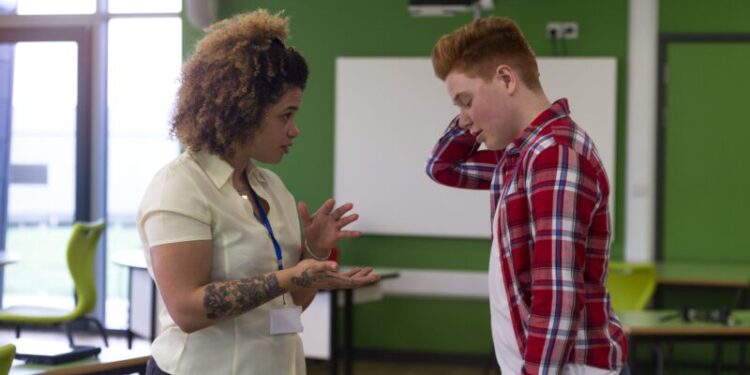Every school year brings new opportunities and challenges, especially with classroom management. Inevitably, situations will escalate in the classroom, such as when students refuse to do work or challenge authority. In preparation for a new school year, and in partnership with the Crisis Prevention Institute (CPI), we’re sharing de-escalation tips for teachers to help us respond effectively when students push our buttons.
1. Be empathetic and nonjudgmental.
Try not to judge or dismiss students’ feelings when they’re in distress. Remember that their feelings are real, whether or not we think those feelings are justified (e.g., Is this assignment really ruining your life?). Respect those feelings, keeping in mind that whatever the person is going through could be the most important event in their life at the moment. Also, the root of the student’s struggles might not be in the assignment. Chances are that the student is upset about something else and needs our support and encouragement.
2. Avoid overreacting.
Try to stay calm, rational, and professional (I know, it’s not always easy). While we can’t control students’ behavior, how we respond to it has a direct effect on whether the situation escalates or defuses. Positive thoughts like “I can handle this” and “I know what to do” help us maintain our own rationality and calm the student down. It’s OK to take a minute to gather our thoughts. When we pause, we prepare ourselves to respond rather than react to classroom conflicts.
“Our students look to us to set the tone in the classroom,” says John Kellerman, a former middle school teacher and assistant principal who now works for CPI. “If we focus on what we can control, and highlight the positives, good things follow. When we highlight the negatives, fear and anxiety follow.”
3. Set positive limits.
One of the most helpful things we can do when a student is misbehaving or acting out in class is to give them respectful, simple, and reasonable limits. If a student argues with us, we might say, “I care about you too much to argue. I’ll be happy to discuss this with you as soon as the arguing stops.” When a student yells, we can try saying, “I’ll be able to listen as soon as your voice is as calm as mine.” If a student won’t do their work, we set a positive limit and say, “After your work is done, you’ll have five free minutes to talk.”
4. Ignore challenging questions.
Sometimes when a student’s behavior is escalating, they challenge our authority. They might say things like “You aren’t my mom!” or “You can’t make me do anything!” Engaging with students who ask challenging questions is rarely productive. When a student challenges our authority, redirect their attention to the issue at hand. Ignore the challenge, but not the person. Bring their focus back to how you can work together to solve the problem. So when a student says, “You aren’t my mom!” we can say, “Yes. You’re right. I’m not your mom. But I am your teacher, and I’d like us to work together so you can be successful on this assignment.”
5. Allow quiet time for reflection.
Teachers are taught to wait for at least five seconds after asking students a question so they have time to process. The same strategy is equally effective when students need to de-escalate. Don’t be afraid of awkward silence (we’ve all been there!). Silence is a powerful communication tool, and it can give students a chance to reflect on what happened and how to proceed. Set up a Calm-Down Corner in your classroom where students can regain composure before returning to the lesson.
6. Do a quick body scan.
When students are pushing our buttons, what we say matters, but how we say it makes a big difference. We can unintentionally co-escalate a student when we raise our voice, and our nonverbal communication cues safety or danger. Crossed arms, a clenched jaw, or hands on hips will not de-escalate. A harsh tone or raised voice won’t help either. When students escalate in class, take a moment to release tension and regain composure so you can show up for your students instead of working against them. Try box breathing or using affirmations and mantras like “I am a calm and capable teacher.” If all else fails, count to ten.
7. Use diffusers to de-escalate.
If you are experiencing a power struggle with a student, you can use responses like “good point,” “I hear you,” and “noted” to de-escalate. Keep the tone of your voice as calm as you can during the exchange. Make eye contact while giving your student enough personal space to calm down. When you use diffusers, you help your student feel seen and heard.
8. Practice reflective teaching.
We may find our students pushing the same buttons again and again. Each time this happens, it is an opportunity to practice de-escalation strategies, and then reflect afterwards. The key to teacher self-reflection is to take a comprehensive, unvarnished look at the past, and determine how best to apply those lessons in the future. Consider the Coping Model to put this practice into action.
Want more de-escalation tips for teachers?
How we respond to our students’ behavior is often the key to defusing it. CPI’s Top 10 De-Escalation Tips is filled with even more simple and effective strategies to help teachers stay calm, manage their own responses, prevent physical confrontations, and more.




















